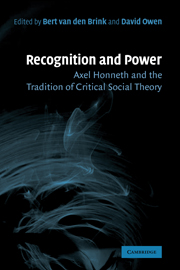Book contents
- Frontmatter
- Contents
- List of Figures and Tables
- Contributors
- Acknowledgments
- 1 Introduction
- PART I PHILOSOPHICAL APPROACHES TO RECOGNITION
- PART II RECOGNITION AND POWER IN SOCIAL THEORY
- PART III RECOGNITION AND POWER IN POLITICAL THEORY
- 9 “To Tolerate Means to Insult”: Toleration, Recognition, and Emancipation
- 10 Misrecognition, Power, and Democracy
- 11 Reasonable Deliberation, Constructive Power, and the Struggle for Recognition
- 12 Self-Government and ‘Democracy as Reflexive Co-operation’: Reflections on Honneth's social and Political Ideal
- PART IV AXEL HONNETH ON RECOGNITION AND POWER
- Bibliography
- Index
9 - “To Tolerate Means to Insult”: Toleration, Recognition, and Emancipation
Published online by Cambridge University Press: 24 July 2009
- Frontmatter
- Contents
- List of Figures and Tables
- Contributors
- Acknowledgments
- 1 Introduction
- PART I PHILOSOPHICAL APPROACHES TO RECOGNITION
- PART II RECOGNITION AND POWER IN SOCIAL THEORY
- PART III RECOGNITION AND POWER IN POLITICAL THEORY
- 9 “To Tolerate Means to Insult”: Toleration, Recognition, and Emancipation
- 10 Misrecognition, Power, and Democracy
- 11 Reasonable Deliberation, Constructive Power, and the Struggle for Recognition
- 12 Self-Government and ‘Democracy as Reflexive Co-operation’: Reflections on Honneth's social and Political Ideal
- PART IV AXEL HONNETH ON RECOGNITION AND POWER
- Bibliography
- Index
Summary
In contemporary political discourse, the concept of toleration plays an important role, ranging from questions of the toleration of cultural and religious minorities within states to the alleged global “clash of civilisations.” But while for some, toleration appears to be the magic word invoking a peaceful and cooperative way of living together in mutual recognition and political equality, for others it is a word signifying power, domination, and exclusion. And this ambivalence about the concept of toleration is not a recent phenomenon, for if we go back to the classic discussions of toleration in the Age of Enlightenment, the latter critique is what Goethe meant when he said: “Tolerance should be a temporary attitude only: it must lead to recognition. To tolerate means to insult.” And the former praise of toleration is expressed by Voltaire, who spoke of toleration as l'apanage de l'humanité, as a sign of true humanity (though also as the fate of humankind).
To gain a deeper understanding of this ambivalence, I want to tell two stories about toleration – a dark and pessimistic one and a bright and optimistic one – and I want to argue that from a sufficiently complex historical perspective, both of them are true. More than that, they are not just historically true; they still inform the contemporary meaning and practices of toleration.
- Type
- Chapter
- Information
- Recognition and PowerAxel Honneth and the Tradition of Critical Social Theory, pp. 215 - 237Publisher: Cambridge University PressPrint publication year: 2007
- 24
- Cited by

